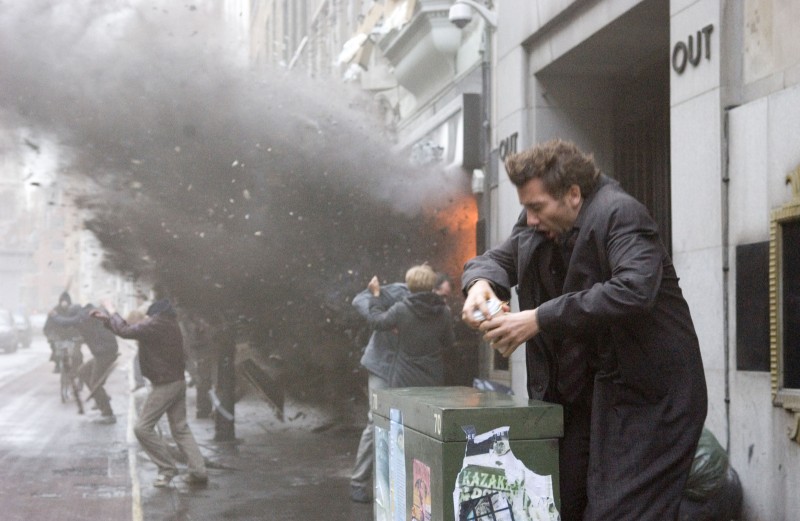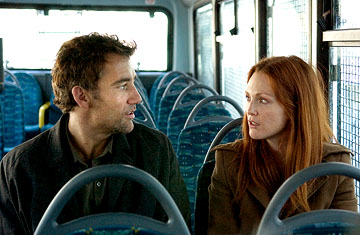
Children of Men, Alfonso Cuaron’s gritty dystopian parable of the near-future (which I saw in Nelson, NZ several days ago), is very, very close to being a great film. Boasting a standout performance by Clive Owen (other than Inside Man he hasn’t been in much lately, so I’d forgotten how good he can be), great character work by Michael Caine, Chiwetel Ejiofor, and others; timely ruminations on issues ranging from the War on Terror to immigration reform; a wicked streak of black humor (note, for example, the bus and pharmaceutical ads, as well as the “Baby Diego” stuff and the casual nod to the similarly sardonic Pink Floyd); cinematography by Emmanuel Lubezki (late of last year’s best film, The New World) that’s both striking and muted; and some of the most visceral urban-warfare scenes this side of Saving Private Ryan, the film has a lot in its corner, and is definitely worth checking out this holiday season. (Between this, The Fountain, and hopefully Pan’s Labyrinth, it’s been a banner time for heady, intelligent sci-fi/fantasy.) Alas, the film takes a few egregious missteps in the last act — the last fifteen minutes, even — which marred the experience for me. As a result, instead of leaving the theater stunned or moved by the otherwise impressive Children of Men, I left irritated with it. It’s a very good, even a remarkable, movie, to be sure, but when it comes to the last few leaps of logic (and sentiment), Cuaron’s film can’t quite stick the landing.
Children of Men takes place in the London of the not-too-distant future, where, as part of a string of world calamities and catastrophes (including some that possibly, Cuaron coyly suggests, have their roots in the Iraq war), humankind has become infertile, western civilization is in the throes of decay, and England, true to stiff-upper-lip form, remains the one teetering bastion of order against the forces of anarchy and global chaos. In this childless city under siege, where immigrants (or “Fugi’s”) are rounded up in cages and coffee shops are bombed for no reason in particular, we meet a troubled Everyman named Theo (Owen — we know he’s troubled because he downs lugs of scotch from a hip-flask whenever possible, but don’t worry — this sort of clumsy screenwriting shorthand is generally the exception here rather than the rule.) At any rate, on his way to work one day, Theo is apprehended by several masked goons in a van, among them his activist ex-girlfriend Julian (Julianne Moore) and her #2 (Ejiofor), who, as it turns out, have a very important task for him — one that only he can fulfill, and one that might just change the shape of this post-apocalyptic world…
If you’ve seen the trailer, then you know what Theo’s charge is for the remainder of the movie. (But if you haven’t, I won’t spoil it here.) Suffice to say, his travels take him to various dilapidated locales in this babyless Purgatory (including, memorably, the hideaway of Theo’s aging drug buddy Jasper (Michael Caine)), and we get a full sense of how the demise of the future, in the form of the next generation, has caused the world to wither and rot. This culminates in some of the most powerful and immersive urban war footage to come down the pike in a good while (note the long, uninterrupted shots in the final act, which are particularly impressive.) But, as you’ll come to find, one of the escape scenarios near the end — you’ll know which one I mean — is completely and utterly implausible, to the detriment of everything that’s come before. And, coupled with the ridiculously over-the-top symbolism in the final moments, Cuaron’s film unfortunately ends on a sour note. Still, if you can forgive the movie its wince of an ending, it’s well worth it to suffer the Children. It may step away from greatness in the last act, but it’s still very easily in the top echelon of movies I’ve seen this year.

